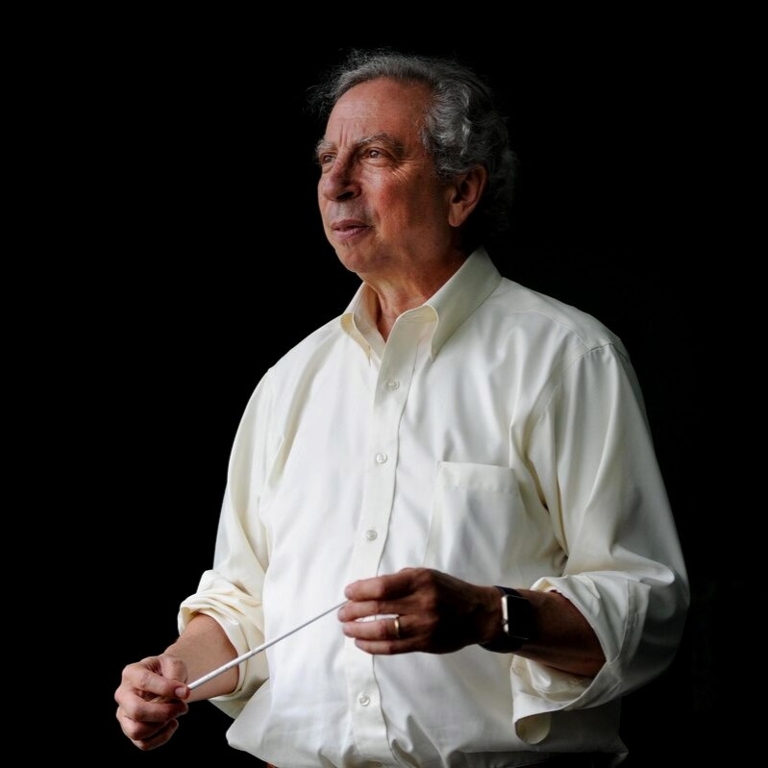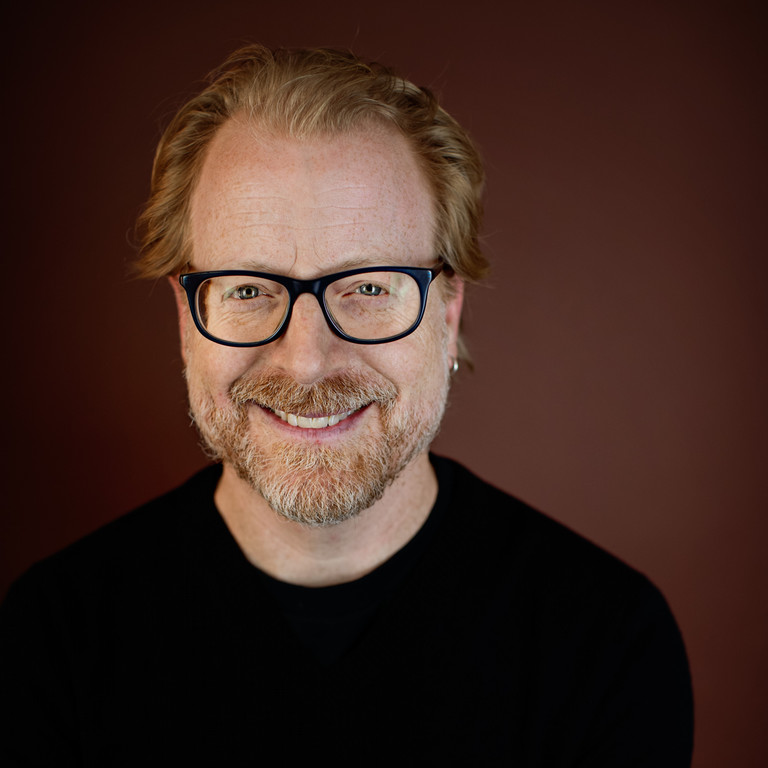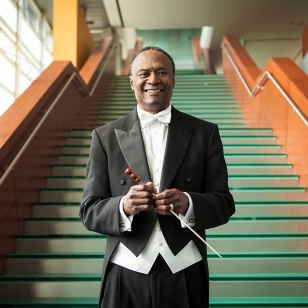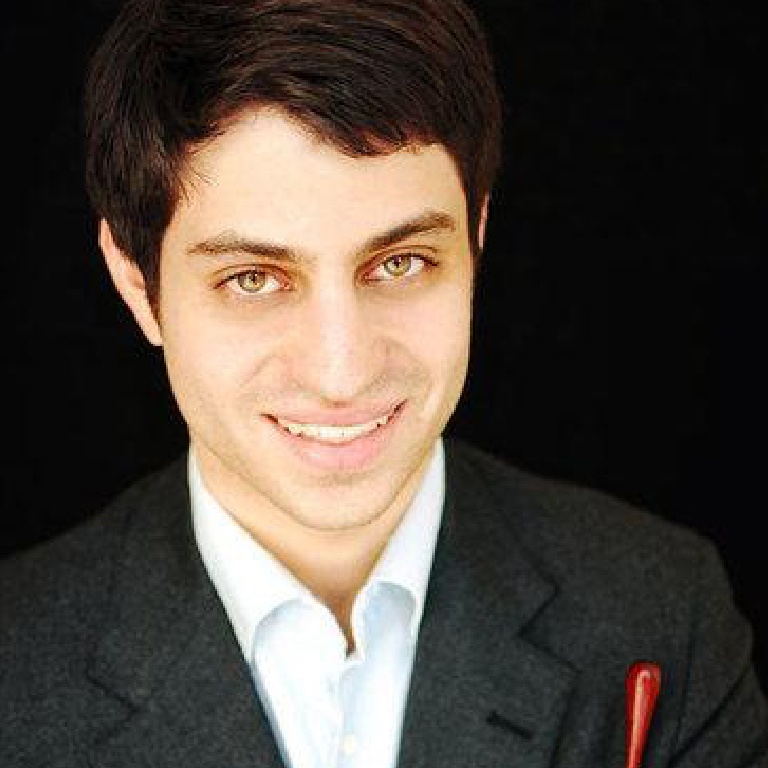
Cochair, Department of Orchestral Conducting
Stepping into the Jacobs School’s orchestral conducting program means becoming part of a carefully curated group of the most promising conductors in the world.
Within this community, students delve deeply into the intricacies of conducting while collaborating with peers driven by a shared vision of excellence, setting the stage for their encounters with world-class ensembles and repertoire.
The Conductors Orchestra, a foundational part of the program, meets three times weekly, offering consistent and rigorous podium time with a top-level ensemble. Recent repertoire studied and performed with this ensemble includes the Beethoven symphonies, Brahms symphonies and Piano Concerto No. 2, Bartók Concerto for Orchestra, Britten Four Sea Interludes, Bruckner Symphony No. 4, Coleman Fanfare for Uncommon Times, Chopin piano concertos, Dvorak Symphonies No. 7 & 9, Debussy La Mer, Ligeti Chamber Concerto, Mahler Symphonies No.1 & 4, the late Mozart symphonies, Sibelius Symphonies No. 1 & 2, Schoenberg Chamber Symphony Op. 9, Schumann Symphonies No. 3 & 4, Prokofiev Romeo and Juliet, Rimsky-Korsakov Scheherazade, Shostakovich Symphonies 5 & 10, Strauss Til Eulenspiegel, Stravinsky Firebird, Petrushka, and Rite of Spring, Tchaikovsky Piano Concerto No.1 and Symphonies No. 4, 5, & 6, Korngold Violin Concerto, and excerpts from Donizetti Lucia di Lammermoor, Mozart Don Giovanni, Puccini La Boheme, Strauss Die Fledermaus, and Tchaikovsky Eugene Onegin.
All degree recitals are performed with this top-level orchestra.
Excellence is a hallmark of the Jacobs School, epitomized by its world-class faculty. Participants in the program enjoy in-depth mentorship from each of our three orchestral conducting faculty that spans beyond conducting technique to encompass civic and artistic leadership, innovative programming, and entrepreneurial ventures.
The curriculum, enriched by contributions from various Jacobs performance and composition faculty, provides in-depth, hands-on training through a holistic educational experience that includes orchestral, ballet, choral, and opera conducting, as well as film, educational, and community engagement concert preparation. Throughout their degree, each graduate conductor works extensively with each of the three orchestral conducting faculty members, gaining a breadth of mentorship that is rare in orchestral conducting programs.
Furthermore, all graduate students receive either artist instructor (AI) positions or scholarship awards that are some of the most competitive in the world.

Cochair, Department of Orchestral Conducting

Cochair, Department of Orchestral Conducting

Henry A. Upper Chair of Orchestral Conducting
A hallmark of the Jacobs School is its emphasis on tangible, real-world experience and exposure. Students frequently engage with internationally acclaimed guest conductors, soloists, and orchestral professionals.
The school's diverse ecosystem of ensembles, which includes six orchestras, operatic and ballet performances, and specialized music ensembles encompassing early and new music, ensures interactions with renowned industry figures and a broad repertoire from early classics to contemporary compositions.
Opportunities such as the Indianapolis Symphony Conducting Fellowship facilitate in-depth networking, rehearsal observation, and yearly conducting master classes. Additionally, affiliations with esteemed orchestras such as the Philadelphia, Cincinnati, Seattle, Los Angeles, and Chicago symphonies allow conductors to connect with a myriad of artistic pioneers and industry leaders.
Graduates of the program stand poised to shape the future landscape of classical music, equipped with a synthesis of technique, artistry, and creative leadership skills.
Each year, depending on the number of graduating conductors, we typically accept two or three new students into the program. The studio consists of six to eight graduate students at any given time.
Students receive an exceptional amount of podium time, including weekly rehearsals with the Conductors' Orchestra, lessons with two pianos, and opportunities to lead rehearsals, sectionals, and coachings as assistant conductors. Additionally, students participate in rehearsals and concerts required for their degree, work with the All-Campus Orchestra, conduct the Fall Ballet, and engage in various projects in new music, opera, film, and dance, depending on their interests.
We seek conductors who demonstrate exceptional musicality, leadership potential, and a deep commitment to the art of conducting and the future of classical music.
Graduate conductors are expected to hit the ground running from day one, with significant responsibilities both on and off the podium. Therefore, it is essential that candidates possess strong technical and musicianship skills, a clear interpretive vision, excellent organizational abilities, and the capacity to communicate effectively in a variety of settings.
Jacobs values applicants who are intellectually curious, open to learning, and eager to engage with diverse repertoire and performance settings. We are looking for conductors who strive for excellence while becoming supportive members of a closely knit cohort of peers.
Above all, we seek individuals driven to contribute meaningfully to the future of classical music through their artistry and leadership, and who have something unique and meaningful to offer the community.
Yes. All graduate students typically receive substantial scholarships or artist instructor positions that are some of the most competitive in the world. While some students may receive an assistantship in their first year, it is also common for others to secure assistantships in their second or third year. Each student is evaluated individually on a case-by-case basis, and the Admissions Office works diligently with each individual to match support with need and talent.
Graduate assistantships include teaching, assistant conductor responsibilities, directing the All-Campus Orchestra, and various administrative duties. These positions are limited and highly competitive.
Every year, the graduate conducting class develops and presents at least one young persons’ concert in consultation with leaders in the field. Opportunities abound for conductors to learn about conducting with film and other media in collaboration with IU’s globally recognized Music Scoring for Visual Media Program. There is also an annual Jacobs Live at the Movies presentation of a full feature film with live orchestra, giving our conductors backstage access to learning this special craft.
Students will find a robust offering of new music and works by historically underrepresented voices within the orchestra, ballet, and opera programs at IU. Recent and upcoming performances have included commissions, premieres, and major works by Mason Bates, Grażyna Bacewicz, Anna Clyne, Unsuk Chin, Reena Esmail, Gabriela Lena Frank, Adolphus Hailstork, Quinn Mason, Carlos Simon, William Grant Still, Anna Thorvaldsdottir, Joan Tower, Melinda Wagner, Chen Yi, and Nina Young, among many others.
The IU New Music Ensemble is one of the top contemporary music ensembles in the world and offers opportunities for graduate conductors to both assist and conduct under the tutelage of professor and composer David Dzubay.
Graduates follow diverse career paths, including professional conducting roles, youth orchestra leadership, and faculty positions at colleges and conservatories. Recent graduates can be found as music directors of professional and youth ensembles, assistant conductors, artistic administrators or staff of major orchestras, and directors of collegiate and conservatory programs throughout the world.
Students regularly engage with internationally acclaimed guest conductors and soloists and participate in opportunities such as the Indianapolis Symphony Conducting Fellowship, offering significant real-world exposure. Almost all guest conductors visit the graduate conducting seminar and the Conductors’ Orchestra, providing graduate conductors important coaching and networking opportunities. There is yearly travel support for opportunities to observe professional orchestras in the area (Chicago, Cincinnati, St. Louis) as well as exchanges with major conducting programs in the U.S. and abroad.
In addition to conducting technique, our curriculum includes training in artistic leadership, innovative programming, and entrepreneurial ventures, preparing students to navigate and shape the future of the classical music landscape. The Jacobs Office of Entrepreneurship & Career Development offers students some of the most robust networking and career development opportunities in the nation.
An M.M. in [XX] Performance may qualify you to apply for the D.M. in Conducting, depending on specific program requirements, the details of the M.M. degree, and the individual’s conducting experience.
Detailed program requirements may be found on the bulletin website.
The application deadline and additional application information may be found in our admissions section.
After all applications are reviewed, a select number of applicants will be invited to audition in person. Auditions include an interview, ear-training and general musicianship exams as well as live conducting. Auditions are usually scheduled in March. Repertoire will be communicated along with invitations for the audition in early January.

Jacobs gives you the opportunity to try a little bit of everything, which is the most useful thing I could have ever done. Going to innumerable concerts and master classes afforded me a wealth of knowledge that I still draw upon.
Nick Hersh, assistant conductor of the Baltimore Symphony Orchestra, Jacobs alumnus